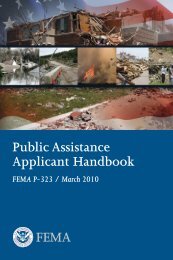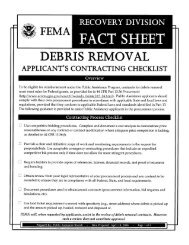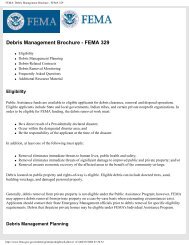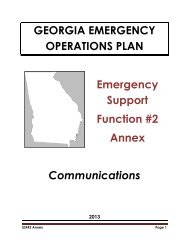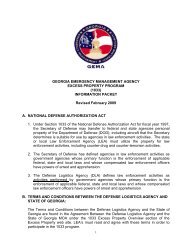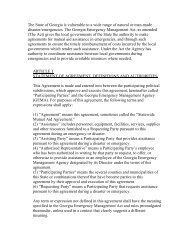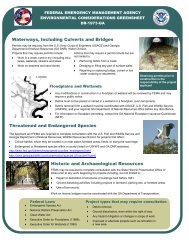Georgia Emergency Operations Plan - GEMA/Homeland Security
Georgia Emergency Operations Plan - GEMA/Homeland Security
Georgia Emergency Operations Plan - GEMA/Homeland Security
Create successful ePaper yourself
Turn your PDF publications into a flip-book with our unique Google optimized e-Paper software.
elating to disaster preparedness with local emergency management<br />
agencies. The state of <strong>Georgia</strong> launched the “Ready <strong>Georgia</strong>”<br />
Campaign in January of 2008. Ready <strong>Georgia</strong> is a statewide campaign<br />
supported by the <strong>Georgia</strong> <strong>Emergency</strong> Management Agency/<strong>Homeland</strong><br />
<strong>Security</strong> aimed at motivating <strong>Georgia</strong>ns to take action to prepare for a<br />
disaster. This campaign provides a local dimension to a broader national<br />
campaign, titled Ready America, and focuses on educating citizens so<br />
that they are better prepared for disasters. The <strong>Georgia</strong> campaign is<br />
supported by the <strong>Georgia</strong> Department of Public Health, The Ad Council,<br />
The Home Depot and volunteer organizations and seeks to coordinate a<br />
cohesive statewide program and a call to action regarding emergency<br />
preparedness. Local <strong>Emergency</strong> Managers and residents are<br />
encouraged to use the resources available on the “Ready <strong>Georgia</strong>”<br />
website to prepare all <strong>Georgia</strong> households for disasters,<br />
www.<strong>GEMA</strong>.ga.gov or contact <strong>GEMA</strong>/HS Public Affairs Division at 1-800-<br />
TRY-<strong>GEMA</strong> or 404-635-7200.<br />
C. Private Sector Partners Responsibility in <strong>Emergency</strong> Management<br />
Government agencies are responsible for protecting the lives and<br />
property of their citizens. However, the government does not and should<br />
not work alone. In many facets of an incident, the government works<br />
with private sector groups as partners in emergency management.<br />
Private sector organizations play a key role before, during, and after an<br />
incident. First, they must provide for the welfare and protection of their<br />
employees in the workplace. <strong>Emergency</strong> managers must work seamlessly<br />
with businesses that provide water, power, communication networks,<br />
transportation, medical care, security, and numerous other services upon<br />
which both response and recovery are particularly dependent.<br />
Participation of the private sector varies based on the nature of the<br />
organization and the nature of the incident. Many private-sector<br />
organizations are responsible for operating and maintaining portions of<br />
the Nation’s critical infrastructure and key resources. Critical<br />
infrastructures include those assets, systems, networks, and functions –<br />
physical or virtual – so vital to the United States that their incapacitation<br />
or destruction would have a debilitating impact on security, national<br />
economic security, public health or safety, or any combination of those<br />
matters. Key resources are publicly or privately controlled resources<br />
essential to minimal operation of the economy and the government.<br />
D. Non-government & Faith Based Organizations in <strong>Emergency</strong><br />
Management<br />
NGOs and Faith Based Organizations (FBO) play enormously important<br />
roles before, during, and after an incident. For example, NGOs and FBOs<br />
<strong>Georgia</strong> <strong>Emergency</strong> <strong>Operations</strong> <strong>Plan</strong> 2013 27 of 71



